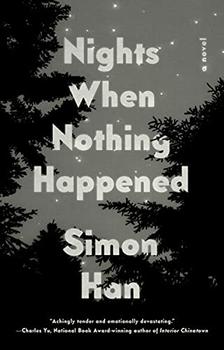Summary | Excerpt | Reviews | Beyond the Book | Read-Alikes | Genres & Themes | Author Bio

This article relates to Nights When Nothing Happened
Simon Han's debut novel Nights When Nothing Happened is set in Plano, Texas, located about 20 miles north of Dallas and 50 miles northeast of Fort Worth. The Chengs, who are Chinese American, have chosen to live in Plano because it is a safe community with good schools, but what's not stated overtly is that the city and surrounding area also have a fairly large East Asian population, including people of Korean, Japanese and Chinese descent. The 2010 United States census put the number of Chinese people living in Plano at 14,500, but in a 2012 interview with D Magazine, executive vice president of the Association of Chinese Professionals Charlie Yue suggested that the real number could be closer to 30,000, which would make up about 10 percent of the overall Plano population, stating that "A lot [of Chinese residents] don't participate in government activities, like the census." Regardless, the official number gives Plano the sixth-largest percentage of Chinese residents in U.S. cities with populations of 250,000 or more, and the Chinese population in the area has continued to show signs of growth in recent years.
Some Chinese American families have been in Texas for generations, largely due to two waves of Chinese immigrant laborers brought in to build railroads — the Texas Central in 1870 and the Southern Pacific in 1881. The Chinese population in Texas stagnated over the next few decades as a result of the 1882 Chinese Exclusion Act, which prohibited Chinese immigration to the United States for the purposes of labor. This act was the result of a combination of typical immigration anxiety regarding "job stealing" and the racist attitudes of some Americans who viewed Chinese residents with suspicion and derision. The act was repealed in 1943 and Chinese immigration resumed. The story of Japanese immigration to Texas is similar, with waves of immigrants arriving around the turn of the 20th century and halting abruptly with the passage of the Immigration Act of 1924, which effectively barred Asian immigration in general. Many Japanese Americans living in Texas were interrogated and placed in internment camps during World War II. Korean immigration to Texas was sparse until the mid-to-late-20th century, but the Dallas region, of which Plano is considered a part, currently has the largest population of Korean Americans of all Texas cities and the fourth-largest of all cities across the U.S.

The late 20th and early 21st centuries brought a considerable number of Chinese immigrants with advanced educations to the Dallas-Fort Worth area, quite a few of whom work in the Texas tech and engineering sectors. In Nights When Nothing Happened, Patty Cheng works at Texas Semiconductor in Dallas on a digital signal processor (DSP) designed for cellphones.
According to the Dallas Observer, Plano has a thriving East Asian food industry. One strip mall in particular is noted for its Taiwanese boba tea shop as well as Sichuanese and Japanese restaurants. There are numerous clusters of Asian eateries like this around Plano, which Observer food reporter Stephanie Kuo notes have "facilitated the forming of visible Asian communities." Kuo goes on to suggest that the proliferation of Asian restaurants in the city is a result of the continued growth of the Asian population there, with Chinese residents making up the largest demographic and having the largest recent increase in numbers (12 percent growth from 2012-2018). Kuo's research suggests that the increase in the Asian population in Plano/Dallas-Fort Worth can be partly attributed to major corporations moving locations from California to Texas, including Toyota, Sony, Panasonic and the Chinese telecommunications company Huawei. Gary Wang, the owner of Chinese restaurant Big Claw, had planned to open his business in San Jose, CA, but decided Plano was a more affordable option with huge prospects due to the rising Asian population. He also cites the availability of multiple Asian markets in the area with necessary authentic ingredients, such as the Jusgo Asian Supermarket and 99 Ranch Market.
Map of ethnic and racial distribution in Plano, Texas from 2010 census data, by Eric Fischer (CC BY-SA 2.0). (Census data applies to all self-identified Asians, not only East Asians.)
Filed under Places, Cultures & Identities
![]() This "beyond the book article" relates to Nights When Nothing Happened. It originally ran in January 2021 and has been updated for the
November 2021 paperback edition.
Go to magazine.
This "beyond the book article" relates to Nights When Nothing Happened. It originally ran in January 2021 and has been updated for the
November 2021 paperback edition.
Go to magazine.
Your guide toexceptional books
BookBrowse seeks out and recommends the best in contemporary fiction and nonfiction—books that not only engage and entertain but also deepen our understanding of ourselves and the world around us.